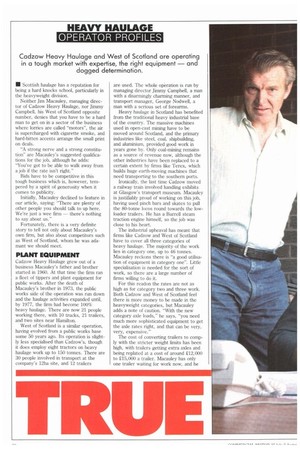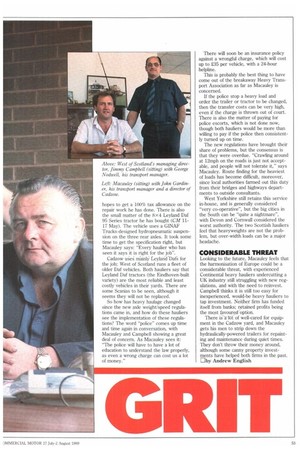Cadzow Heavy Haulage and West of Scotland are operating in
Page 52

Page 53

If you've noticed an error in this article please click here to report it so we can fix it.
a tough market with expertise, the right equipment — and dogged determination.
• Scottish haulage has a reputation for being a hard knocks school, particularly in the heavyweight division.
Neither Jim Macauley, managing director of Cadzow Heavy Haulage, nor Jimmy Campbell, his West of Scotland opposite number, denies that you have to be a hard man to get on in a sector of the business where lorries are called "motors", the air is supercharged with cigarette smoke, and hard-bitten accents arrange the small print on deals.
"A strong nerve and a strong constitution" are Macauley's suggested qualifications for the job, although he adds: "You've got to be able to walk away from a job if the rate isn't right" Bids have to be competitive in this tough business which is, however, tempered by a spirit of generosity when it comes to publicity.
Initially, Macauley declined to feature in our article, saying: "There are plenty of other people you should talk to up here. We're just a wee firm — there's nothing to say about us."
Fortunately, there is a very definite story to tell not only about Macauley's own firm, but also about competitors such as West of Scotland, whom he was adamant we should meet.
PLANT EQUIPMENT
Cadzow Heavy Haulage grew out of a business Macauley's father and brother started in 1960. At that time the firm ran a fleet of tippers and plant equipment for public works. After the death of Macauley's brother in 1973, the public works side of the operation was run down and the haulage activities expanded until, by 1977, the firm had become 100% heavy haulage. There are now 21 people working there, with 10 trucks, 21 trailers, and two sites near Hamilton.
West of Scotland is a similar operation, having evolved from a public works base some 50 years ago. Its operation is slightly less specialised than Cadzow's, though it does employ eight tractors on heavy haulage work up to 150 tonnes. There are 30 people involved in transport at the company's 12ha site, and 12 trailers are used. The whole operation is run by managing director Jimmy Campbell, a man with a disarmingly charming manner, and transport manager, George Nodwell, a man with a serious set of forearms.
Heavy haulage in Scotland has benefited from the traditional heavy industrial base of the country. The massive machines used in open-cast mining have to be moved around Scotland, and the primary industries like steel, coal, shipbuilding, and aluminium, provided good work in years gone by. Only coal-mining remains as a source of revenue now, although the other industries have been replaced to a certain extent by firms like Terex, which builds huge earth-moving machines that need transporting to the southern ports.
Ironically, the last time Cadzow moved a railway train involved handling exhibits at Glasgow's transport museum. Macauley is justifiably proud of working on this job, having used pinch bars and skates to pull the 80-tonne locos round towards the lowloader trailers. He has a Burrell steam traction engine himself, so the job was close to his heart.
The industrial upheaval has meant that firms like Cadzow and West of Scotland have to cover all three categories of heavy haulage. The majority of the work lies in category one, up to 46 tonnes. Macauley reckons there is "a good utilisation of equipment in category one". Little specialisation is needed for the sort of work, so there are a large number of firms willing to do it.
For this readon the rates are not as high as for category two and three work. Both Cadzow and West of Scotland feel there is more money to be made in the heavyweight categories, but Macauley adds a note of caution. "With the new category axle loads," he says, "you need much more sophisticated equipment to get the axle rates right, and that can be very. very, expensive."
The cost of converting trailers to comply with the stricter weight limits has been high, with trailers getting extra axles and being replated at a cost of around £12,000 to £15,000 a trailer. Macauley has only one trailer waiting for work now, and he
hopes to get a 100% tax allowance on the repair work he has done. There is also the small matter of the 8x4 Leyland Daf 95 Series tractor he has bought (CM 1117 May). The vehicle uses a ULNAE Trucks-designed hydropneumatic suspension on the three rear axles. It took some time to get the specification right, but Macauley says: "Every haulier who has seen it says it is right for the job".
Cadzow uses mainly Leylan-d-Dafs. for the job; West of Scotland runs a fleet of older Daf vehicles. Both hauliers say that Leyland Daf tractors (the Eindhoven-built variety) are the most reliable and least costly vehicles in their yards. There are some Scanias to be seen, although it seems they will not be replaced.
So how has heavy haulage changed since the new axle weight/speed regulations came in, and how do these hauliers see the implementation of these regulations? The word "police" comes up time and time again in conversation, with Macauley and Campbell showing a great deal of concern. As Macauley sees it: "The police will have to have a lot of education to understand the law properly, as even a wrong charge can cost us a lot of money." There will soon be an insurance policy against a wrongful charge, which will cost up to 235 per vehicle, with a 24-hour helpline.
This is probably the best thing to have come out of the breakaway Heavy Transport Association as far as Macauley is concerned.
If the police stop a heavy load and order the trailer or tractor to be changed, then the transfer costs can be very high, even if the charge is thrown out of court. There is also the matter of paying for police escorts, which is not done now, though both hauliers would be more than willing to pay if the police then consistently turned up on time.
The new regulations have brought their share of problems, but the consensus is that they were overdue. "Crawling around at 12mph on the roads is just not acceptable, and people will not tolerate it," says Macauley. Route finding for the heaviest of loads has become difficult, moreover, since local authorities farmed out this duty from their bridges and highways departments to outside consultants.
West Yorkshire still retains this service in-house, and is generally considered "very co-operative", but the big cities in the South can be "quite a nightmare", with Devon and Cornwall considered the worst authority. The two Scottish hauliers feel that heavyweights are not the problem, but over-width loads can be a major headache.
CONSIDERABLE THREAT
Looking to the future, Macauley feels that the harmonisation of Europe could be a considerable threat, with experienced Continental heavy hauliers undercutting a UK industry still struggling with new regulations, and with the need to reinvest. Campbell thinks it is still too easy for inexperienced, would-be heavy hauliers to tap investment. Neither firm has funded itself from banks; retained profits being the most favoured option.
There is-a-tot of well-cared for equipment in the Cadzow yard, and Macauley gets his men to strip down the hydraulically-powered trailers for repainting and maintenance during quiet times. They don't throw their money around, although some canny property investments have helped both firms in the past. []by Andrew English




































































































































